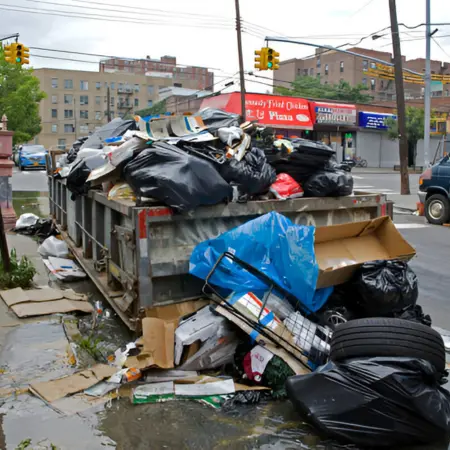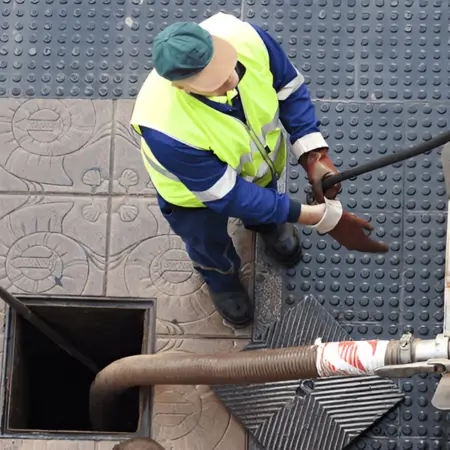Sewer backups can cause serious damage to your home if not caught early.
Knowing the signs can help you take action before it’s too late.
This article shares what every homeowner should look out for to prevent a messy and costly sewer backup.
Stay ahead of the problem with these helpful tips.
Key Takeaways
- Unusual odors like sewage and rotten eggs can need a sewer backup.
- Slow drains in sinks, showers, and toilets may signal a blockage in the sewer line.
- Gurgling sounds from drains suggest air is trapped due to a clogged sewer line.
- Many fixtures backing up at once is a major sign of a sewer line issue.
- Water pooling in the yard near the sewer line could mean a leak and blockage.
- Regular drain cleaning helps prevent sewer backups and keeps your plumbing clear.
- Stop using water immediately and call a professional if you suspect a sewer backup.
5 Warning Signs Of A Sewer Backup
A sewer backup can cause major damage if not caught early.
Knowing the warning signs can help you take action before it’s too late.
Here are five key signs to watch that may show a sewer backup is on the way.
1. Unusual Odors
If you smell something foul, like sewage and rotten eggs, it could mean a sewer problem.
These smells happen when waste starts to back up in your pipes instead of flowing out.
The odor is a warning that something is blocking the sewer line.
Don’t ignore these smells.
Act fast to avoid bigger issues.
2. Slow Drains
When water drains slowly from your sink, shower, or toilet, it’s a sign that something is wrong.
A blockage in the sewer line can prevent water from flowing properly.
To test for this, check several drains in your home.
If more than one is slow, the problem is likely with the main sewer line.

3. Gurgling Sounds
If you hear gurgling and bubbling noises coming from your toilet or drains, it’s a red flag.
These sounds happen when air gets trapped in the pipes due to a blockage.
Gurgling usually means the sewer line is clogged, and the water can’t flow properly.
This needs to be checked before it gets worse.
4. Many Fixtures Backing Up
If more than one fixture, like your toilet and sink, starts backing up at the same time, it’s a big sign of a sewer line issue.
This happens when the main sewer line is blocked, preventing water from draining.
When many fixtures are affected, it’s more than just a small clog; you’ll need professional help.
Contact us at Sewer Cleaning Services for expert help.
5. Water Pooling In Yard
If you see water pooling in your yard, especially near the sewer line, it could mean a sewer backup.
This happens when the sewer line leaks and overflows.
The pooling water is wastewater that isn’t draining properly.
This usually means your sewer line is blocked and damaged.
If you notice this, check your system quickly to prevent more damage.
Preventative Measures
Here are some simple preventative measures to help protect your plumbing and avoid costly problems.
1. Regular Drain Cleaning
Routine drain cleaning is an easy way to prevent sewer backups.
Over time, grease, soap, food particles, and other debris can build up inside your pipes.
Regular cleaning helps keep your drains clear and reduces the risk of clogs.
Having your drains cleaned at least once a year is a good idea.
This helps keep your plumbing running smoothly and avoids costly repairs later on.
2. Proper Disposal Practices
What you throw down your drains can affect the health of your plumbing system.
Avoid flushing things like paper towels, wet wipes, grease, oils, and food scraps down the drain.
These items can cause blockages and lead to backups.
Instead, dispose of these items in the trash.
Also, use a strainer in your kitchen sink to catch food particles and prevent them from going down the drain.

3. Maintain Your Plumbing System
Regular plumbing inspections are essential to prevent sewer backups.
Pipes can wear down, get damaged, and become clogged over time.
That’s why it’s important to have them checked by a professional.
Hiring a plumber for routine maintenance can help identify issues before they become serious problems.
Regular upkeep can save you money and prevent emergency plumbing situations.
Contact us at OP Plumbing Hub for excellent services.
What To Do If You Suspect A Backup
If you think there’s a sewer backup in your home, acting quickly is important.
Here’s what you should do to prevent further damage and get your needed help.
1. Stop Using Water Immediately
If you suspect a sewer backup, the first thing you should do is stop using water.
This means no flushing toilets, running faucets, and using the shower.
Using water can worsen the backup by pushing more waste into the pipes, causing bigger issues.
It’s important to stop to avoid further damage to your plumbing and your home.

2. Call A Professional
Next, you should contact a plumber or sewer specialist as soon as possible.
Professionals have the tools and experience to identify and fix sewer backups safely.
When choosing a professional, ensure they have a good reputation and the right licenses.
Also, check if they have experience with sewer problems.
You can also check reviews or ask friends and family for recommendations to find a trusted expert.
3. Document The Issue
Documenting the situation for insurance (security) purposes is also a good idea.
Take photos of any visible damage or flooding and describe what happened.
This will help you when you file an insurance claim or keep a record of the problem.
This information can speed up the claims process and ensure you get the needed support.
Conclusion
This article discusses the signs of a sewer backup.
Knowing them can help you take action before it’s too late.
Stay alert and address any issues early to protect your home and plumbing.
What to do in such a situation has also been discussed.
Contact us at OP Plumbing Hub for expert advice and help.
